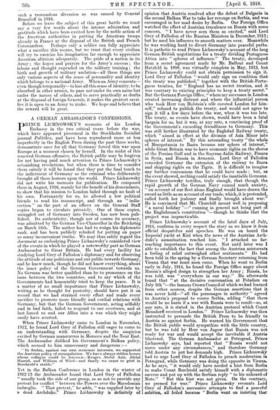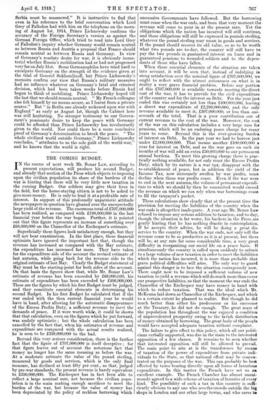A GERMAN AMBASSADOR'S CONFESSIONS.
PRINCE LICHNOWSKY'S memoirs of his London Embassy in the two critical years before the war, which have appeared piecemeal in the Stockholm Socialist journal Politiken, and have been reproduced more or less imperfectly in the English Press during the past three weeks, demonstrate once for all that Germany forced this war upon Europe at a Moment chosen by herself. In the midst of this renewed German offensive, the British public may be forgiven for not having paid much attention to Prince Lichnowsky's astonishing revelations, but when there is time to consider them calmly it will be found that they put the final touch to the indictment of Germany as the criminal who deliberately brought all these horrors upon the world. Prince Lichnowsky did not write his memoirs for publication. He composed them in August, 1916, mainly for the benefit of his descendants, to show that his mission to London failed through no fault of his own. Fortunately for us, he allowed a few political friends to read his manuscript, and through an "indis- cretion" on the part of an officer on the General Staff copies began to circulate privately. One of these copies, smuggled. out of Germany into Sweden, has now been pub- lished. Its authenticity, though not of course its accuracy, was admitted by the German Vice-Chancellor in the Reichstag on March 16th. The author has had to resign his diplomatic rank, and has been publicly rebuked for putting on paper so many inconvenient truths. We may thus safely regard the document as embodying Prince Lichnowsky's considered view of the events in which he played a noteworthy part as German Ambassador to Great Britain. He had every facility for studying Lord Grey of Fallodon's diplomacy and for observing the attitude of our politicians and our public towards Germany, and he knew much, though he did not know everything, about the inner policy of the German Government towards us. No German was better qualified than he to pronounce on the issue between the two countries, and to say which of the Governments had honourably tried to keep the peace. It is a matter of no small importance that Prince Lichnowsky, writing as he thought for posterity, should have put it on record that we had strained every effort and made every sacrifice to promote more friendly and cordial relations with Germany, but that the German Government, acting selfishly and in bad faith, failed to respond to our overtures, and at last forced us and our Allies into a war which they might easily have averted.
When Prince Lichnowsky came to London in November, 1912, he found Lord Grey of Fallodon still eager to come to an understanding with Germany, despite the suspicion excited by German manoeuvres in Morocco and the Near East. The Ambassador disliked his Government's Balkan policy, which seemed to him unnecessary and dangerous :— " In Serbia, against our own economic interests, we supported the Austrian policy of strangulation. We have always ridden horses whose collapse could be foresecn—Kruger, Abdul Aziz, Abdul Hamid, and William of Wied—and finally we came to grief in Berchtold's stable."
Yet in the Balkan Conference in London in the winter of 1912-13 the Ambassador found that Lord Grey of Fallodon "usually took the side of our group, so as not to provide any pretext for conflict" between the Powers over the Macedonian imbroglio. "That pretext," he adds, "was supplied later by a dead Archduke.' Prince Lichnowsky is definitely of opinion that Austria resolved after the defeat of Bulgaria in the second Balkan War to take her revenge on Serbia, and was encouraged in her mad desire by Berlin. Our Foreign Office watched the effect of Austrian truculence on Russia with some concern. "I have never seen them so excited," said Lord Grey of Fallodon of the Russian Ministers in December, 1913; but he used his influence to smooth matters over. Meanwhile he was working hard to divert Germany into peaceful paths. It is pathetic to read Prince Lichnowsky's account of the long German-British negotiations for a treaty dividing Portuguese Africa into "spheres of influence." The treaty, developed. from a secret agreement made by Mr. Balfour and Count Hatzfeld in 1898, was virtually complete in May, 1913, but Prince Lichnowsky could. not obtain permission to sign it. Lord. Grey of Fallodon "would only sign on condition that the treaty was published," together with the British-Portu- guese treaties, for "England. has no secret treaties, and. it was contrary to existing principles to keep a treaty secret." But the German Foreign Office, " where my successes in London created increasing distrust and where the influential person who took Herr von Holstein's role coveted London for him- self," refused to publish the treaty, and would not agree to sign it till a few days before the war, when it was too late. The treaty, as events have shown, would have been a fatal bargain for us, but it was, at any rate, a convincing proof of the Government's exceeding friendliness to Germany. This was still further illustrated by the Baghdad Railway treaty, which "aimed. in effect at the division of Asia Minor into spheres of interest." By this astounding treaty "the whole of Mesopotamia to Basra became our sphere of interest," while Great Britain was to have economic rights on the shores of the Persian Gulf and in the Smyrna-Aidin Railway, France in Syria, and Russia in Armenia. Lord Grey of Fallodon conceded Germany the extension of the railway to Basra and shipping rights on the Tigris. It is difficult to imagine any further concessions that he could have made; • but, as the event showed, nothing could satisfy the insatiable Germans. Prince Lichnowsky testifies, truly enough, that though the rapid growth of the German Navy caused much anxiety, "on account of our fleet alone England would have drawn the sword as little as on account of our trade, which, it is pretended, called forth her jealousy and finally brought about war." He is convinced that Mr. Churchill meant well in proposing "a naval holiday "—" cunning in general not being part of the Englishman's constitution '—though he thinks that the project was impracticable.
Prince Lichnowsky's account of the fatal days of July, 1914, confirms in every respect the story as we know it from official despatches and speeches. He was on board the Imperial yacht at Kiel when the news of the Austrian Arch- duke's assassination reached him. "I attached no far- reaching importance to this event. Not until later was I able to establish the fact that among the Austrian aristocrats a feeling of relief outweighed other sentiments." He had been told. in the spring by a German Secretary returning from Vienna that war must soon come. When he went to Berlin early in July, 1914, he found the Foreign Office angry about Russia's alleged design to strengthen her Army ; Russia, he was told, was "everywhere in our way." He afterwards found that "at the decisive conversation at Potsdam on July 5th "—the famous Crown Council of which we had learned from other sources, despite the German assertions that it was never held—" all the personages in authority" agreed. to Austria's proposal to coerce Serbia, adding "that there would be no harm if a war with Russia were to result—so, at any rate, it is stated in the Austrian protocol which Count Mensdorff received in London." Prince Lichnowsky was then instructed to persuade the British Press to be friendly to Austria as against Serbia. He warned his Government that the British public would sympathize with the little country, but he was told by Herr von Jagow that Russia was not ready for war and would accept the inevitable if Austria blustered. The German Ambassador at Petrograd, Prince Lichnowsky says, had reported that "Russia would not move under any circumstances," and therefore Germany told Austria to put her demands high. Prince Lichnowsky had to urge Lord Grey of Fallodon to preach moderation in Petrograd, while Germany was doing the opposite in Vienna. As he says, "it would only have needed a hint from Berlin to make Count Berehtold satisfy himself with a diplomatic success and put up with the Serbian reply "to his unheard-of Note." "But this hint was not given. On the contrary, we pressed for war." Prince Lichnowsky recounts . Lord Grey of Fallodon's successive attempts to find a peaceful solution, all foiled because "Berlin went on insisting that Serbia must be massacred." It is instructive to find that even in his reference_ to the brief conversation which Lord Grey of Fallodon had with him on the telephone on the morn- ing of August 1st, 1914, Prince Lichnowsky confirms the accuracy of the Foreign Secretary's version as against the German Foreign Office, which tried to read into Lord Grey of Fallodon's inquiry whether Germany would remain neutral as between Russia and Austria a proposal that France should remain neutral as between Russia and Germany. In view of Germany's resolute desire for war, it is obviously imma- terial whether Russia's mobilization had or had not progressed very far on July 31st. Some Germanophiles have tried hard to exculpate Germany on the strength of the evidence given at the trial of General Sukhomlinoff, but Prince Lichnowsky's memoirs confirm our view that Russia's military measures had no influence whatever on Germany's fatal and criminal decision, which had been taken weeks before Russia had begun to think of mobilizing. Prince Lichnowsky hoped till the last that we should remain neutral. "My French colleague also felt himself by no means secure, as I learnt from a private source." But "in Berlin one already reckoned upon war with England" as early as August 1st, though the Cabinet here was still hesitating. No stronger testimony to our Govern- ment's passionate desire to keep the peace with Germany could be afforded than Prince Lichnowsky has involuntarily given to the world. Nor could there be a more conclusive proof of Germany's determination to break the peace. "The whole civilized world outside Germany," Prince Lichnowsky concludes, "attributes to us the sole guilt of the world-war," and he knows that the world is right.



























 Previous page
Previous page